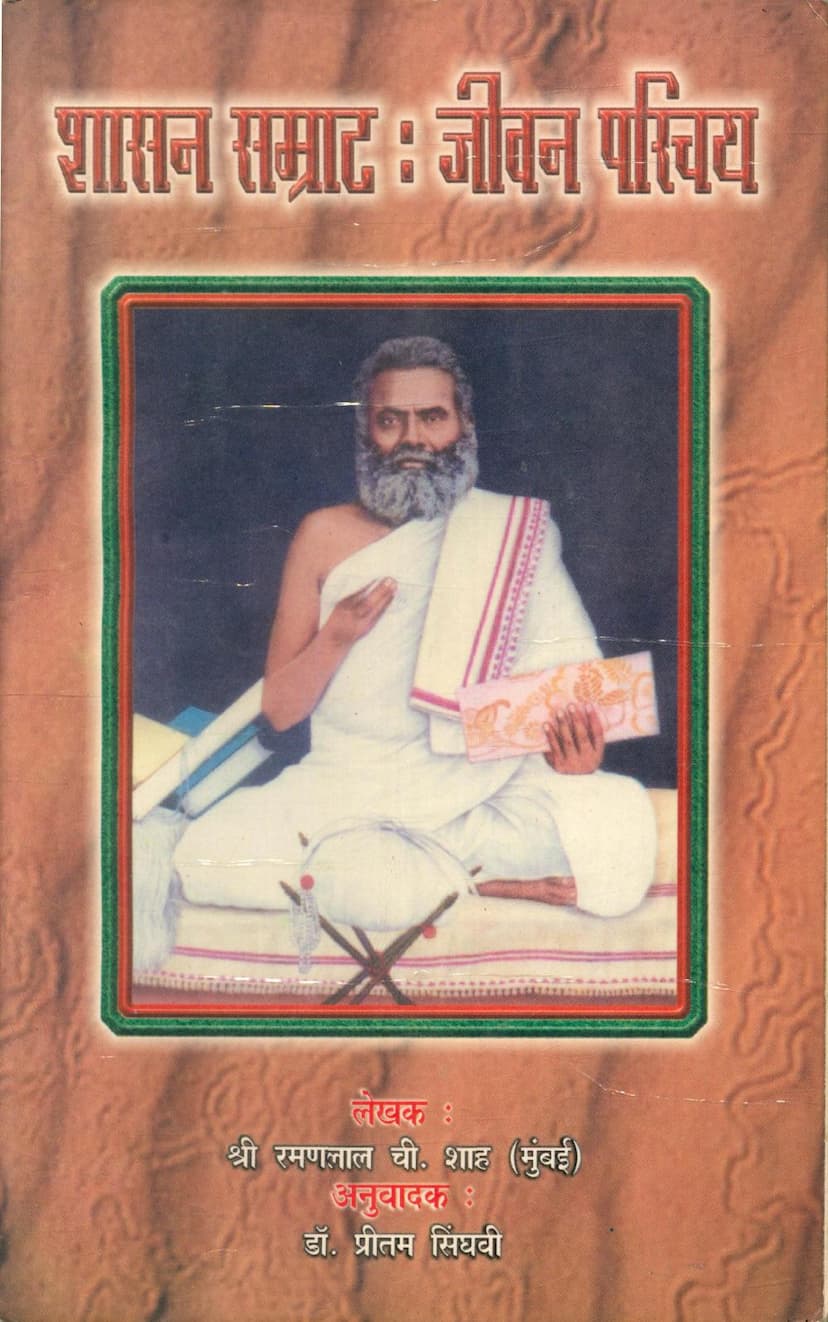Shasan Samrat Jivan Parichay
Added to library: September 2, 2025

Summary
Here is a comprehensive summary in English of the Jain text "Shasan Samrat Jivan Parichay" (The Life Story of the Emperor of Governance), authored by Ramanlal C. Shah and translated by Dr. Pritam Singhvi, published by Parshv International Educational and Research Foundation in 1999.
Overall Summary:
"Shasan Samrat Jivan Parichay" is a biography chronicling the exemplary life of Param Pujya Shri Vijayanemisurishwarji Maharaj, a highly revered Jain Acharya who lived in the 20th century (Vikram Samvat). The book details his spiritual journey, his significant contributions to the Jain faith and community, his intellectual prowess, and his exemplary conduct, earning him the title "Shasan Samrat" (Emperor of Governance). The work highlights his profound impact on spiritual and social reforms, his vast knowledge, and his compassionate nature, making his life a source of inspiration for generations.
Key Aspects and Life Events:
-
Early Life and Prophecy: Born in Mahuva, Saurashtra, on Kartik Sud 1st (the day after Diwali) in VS 1929, Nemchand (his given name) was destined for greatness. His birth horoscope, analyzed by a renowned astrologer, predicted a life as a great saint, specifically an "Avadhoot" (a detached spiritual being). His parents, Laxmichandbhai and Diwaliben, were overjoyed.
-
Education and Quest for Knowledge: Nemchand received a strong education, progressing through Gujarati vernacular schools and later an English school. His thirst for knowledge led him to study Sanskrit and religious texts under the guidance of revered Acharya Shri Vriddhichandji Maharaj in Bhavnagar. He excelled in his studies, demonstrating a sharp intellect and a profound curiosity.
-
Inclination Towards Renunciation: Even in his youth, Nemchand felt a strong pull towards the ascetic life, finding it far superior to worldly existence. This inclination grew, and he even wrote to his father about the impermanence of life when his grandmother passed away, sparking concern in his father about his potential renunciation.
-
Renunciation and Diksha (Initiation): Despite his father's attempts to engage him in business and keep him home, Nemchand, along with his friend Durlabhji, ran away to Bhavnagar to pursue renunciation. Initially, Acharya Vriddhichandji hesitated to grant him Diksha without parental consent. However, after Durlabhji received Diksha, Nemchand, in a display of immense determination, donned the monastic robes himself and approached Acharya Vriddhichandji, who then performed the formal initiation ceremony. He was named Nemvijayji. This event occurred on Jeth Sud 7th in VS 1945.
-
Parental Opposition and Resolution: His father, Laxmichandbhai, came to Bhavnagar to bring him back. Despite initial anger and attempts to involve the magistrate, the magistrate ruled that Nemchand had taken Diksha of his own free will. Ultimately, his father accepted the situation and returned to Mahuva.
-
Scholarly Pursuits and Intellectual Prowess: Munishri Nemvijayji dedicated himself to rigorous scriptural study under his guru. He possessed exceptional memory and comprehension skills. He studied grammar, philosophy, and various Jain Agamas. His eloquence and clarity in explaining complex Jain doctrines became renowned. He even participated in and won a public debate in Sanskrit against a scholar from Kashi, further enhancing his reputation.
-
Key Contributions and Activities:
- "Shasan Samrat" Title: He earned the title "Shasan Samrat" for his immense contributions to the Jain faith and governance.
- Promoter of Jain Principles: He actively worked for the restoration and protection of Jain pilgrimage sites (Tirthoddhar and Tirthraksha).
- Revival of Rituals: He re-established forgotten or neglected Jain rituals like Siddha-Chakra Pujan and Arhant Pujan.
- Fostering a Scholarly Community: He prepared numerous learned disciples, organized knowledge repositories, and promoted learning.
- Social and Humanitarian Work: He was deeply involved in promoting "Jivdaya" (compassion for all living beings), establishing charitable institutions (Dharmashalas, Pathshalas, Upashrayas), and actively supporting animal shelters (Panjrapols).
- Leadership in Sangh Yatras: He led numerous successful "Ari-Palak Sangh" (pilgrimage groups), notably the first large-scale ones to Shatrunjay and Girnar, which significantly boosted religious devotion.
- Intellectual Contributions: He authored several significant works, including "Pariharya Mimansa" (in response to Dr. Jacobi), treatises on logic and philosophy, and commentaries on Jain scriptures.
- Resolution of Disputes: He played a crucial role in resolving disputes, including the significant conflict over Shatrunjay pilgrimage rights with the Palitana Thakur, demonstrating exceptional diplomacy and strategic acumen. He also mediated in social conflicts and disputes related to Jain institutions.
- Promoting Jain Education: He advocated for and established Jain Pathshalas and Kanyashalas (schools for girls), and also supported mobile educational initiatives.
- Addressing Societal Issues: He actively intervened in times of natural calamities like famines and epidemics, organizing relief efforts and contributing to public welfare. He also worked to curb practices like animal sacrifice.
- Promoting Jain Unity: He fostered a spirit of unity and understanding among different Jain sects and even engaged in dialogue with scholars from other traditions.
-
Later Life and Passing: Acharya Vijayanemisurishwarji Maharaj continued his spiritual and social endeavors throughout his life. Despite declining health, he remained dedicated to his mission. His final days were spent in Mahuva, his birthplace, where he had a profound impact on his community, including his parents. He attained Nirvana on Kartik Sud 1st (New Year's Day) in VS 2006, during his 77th year, mirroring the auspicious day of his birth, an incredibly rare yoganuyog (auspicious coincidence).
Significance of the Title "Shasan Samrat":
The title "Shasan Samrat" signifies his unparalleled role in the governance, administration, and spiritual upliftment of the Jain community. His leadership was marked by wisdom, courage, compassion, and unwavering commitment to the Jain Dharma, making him a true emperor of spiritual governance.
Overall Impact:
The biography emphasizes that Acharya Vijayanemisurishwarji Maharaj's life was filled with inspiring events and significant achievements. His unwavering dedication to Jain principles, his extensive knowledge, his profound compassion, and his ability to mobilize communities for good causes left an indelible mark on Jainism. He is remembered as a guiding light whose life continues to inspire devotion and spiritual pursuit. The book serves as a testament to his virtuous conduct and his immense contribution to the Jain Shasan.